Euroconsumers Forum: charting a path in a world of complexity
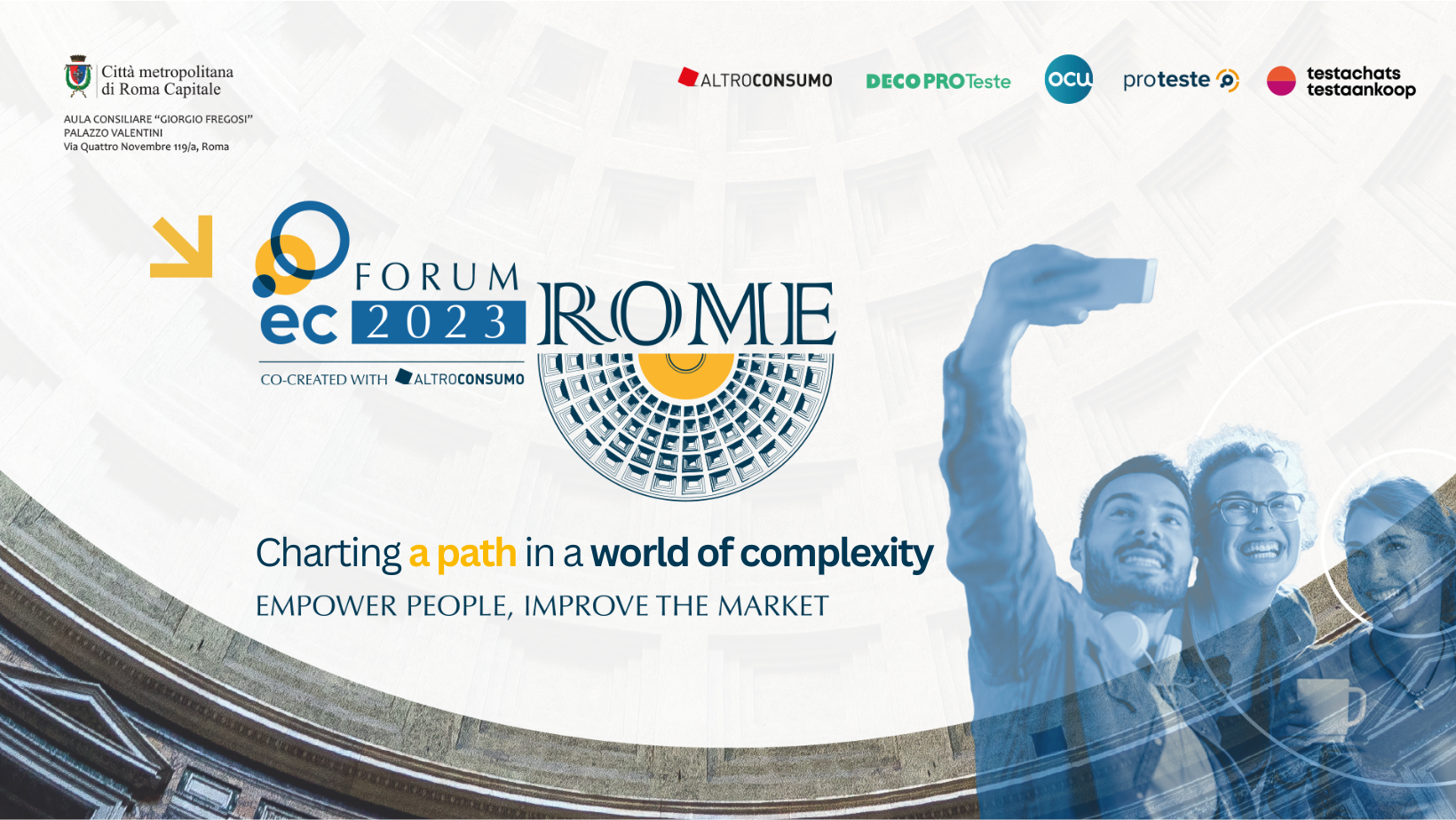
Euroconsumers Forum is like no other consumer organisation event. Each year, a dynamic cross-disciplinary programme of thought leaders, decision-makers and innovators inspire the audience to think big about the consumer future.
On October 27th 2023, we welcomed over a hundred people to the Palazzo Valentini in Rome, with many more participants from across the world joining online.
They heard thought-provoking, globally renowned speakers diving into Euroconsumers’ key question: what does it mean to Empower Consumers, Improve the market in an era of continuous and complex change?
In a world reeling from the consequences of the covid-19 pandemic, disrupted supply chains, devastating conflicts, high inflation and fast computing, the participants helped make sense of this complexity and its impact on consumer market dynamics.
This piece attempts to do justice to the interventions of just a handful of the Forum’s speakers welcomed to the stage by Euroconsumers new CEO Antonio Balhanas.
A new social contract for digitisation
First up, Alec Ross, Distinguished Visiting Professor at l’Universitá di Bologna Business School and former advisor to Barack Obama, spoke about how technology impacts on democracy and markets in multiple ways.
He began by saying that the disruption in access to information and communications that has transformed the political and media realm is now about to reshape new industries.
Just as power in agricultural economies sat with those owned land, power in industrial economies was held by those who owned factories, in the technological age economic and political power will be held by those who own, control and harvest data.
Renowned architect and engineer and Director of the Senseable City Lab at MIT Boston, Carlo Ratti also talked about data’s potential to create cities that serve people:
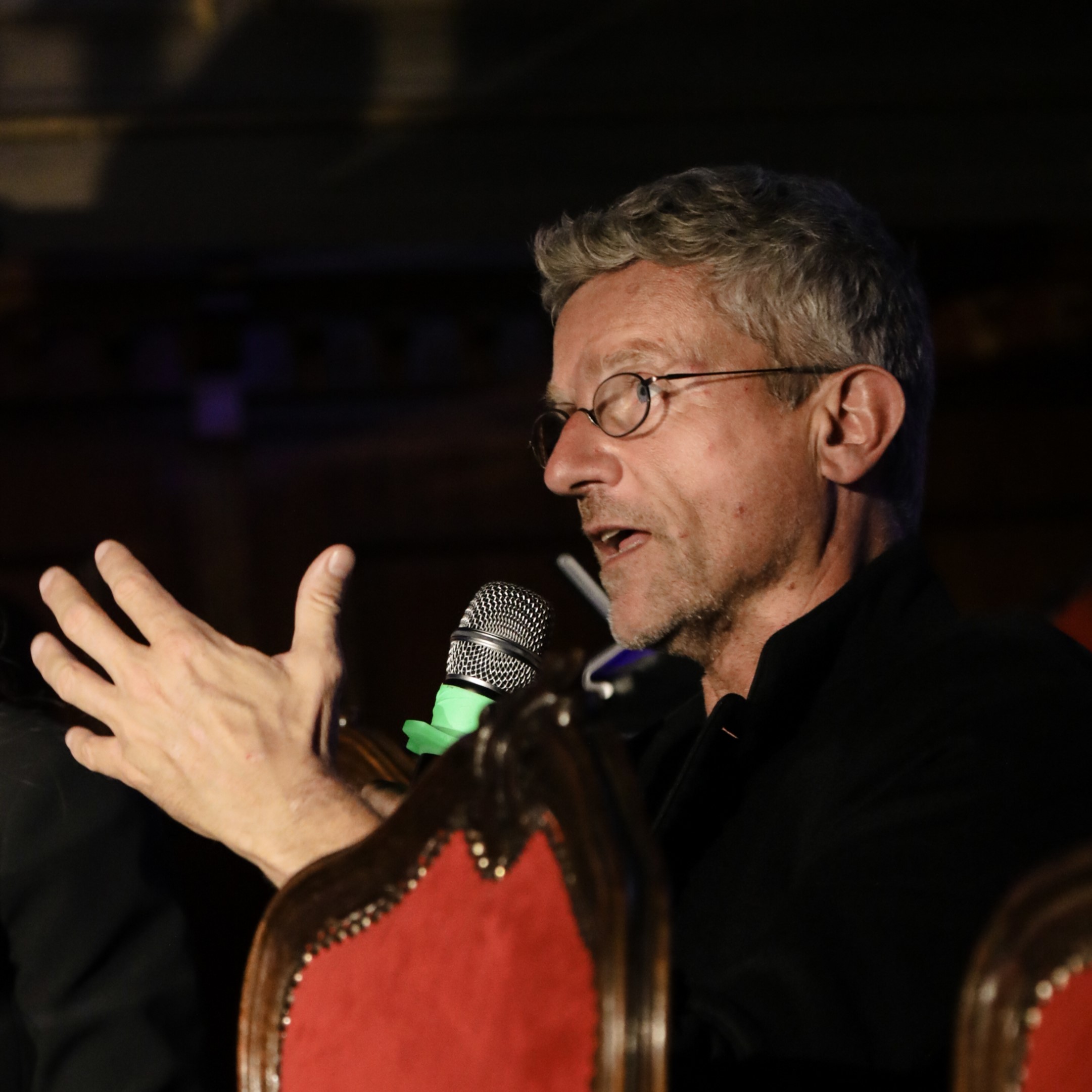
“Today, we have a lot of data in our cities, which means better insights especially when shared transparently, enabling better understanding and informed decision-making. Properly used, data can lead to a more open and informed society."
Carlo Ratti, Director of the Senseable City Lab at MIT
Later Carlo Alberto Carnevale-Maffe stressed the European view on data and data use, which includes a need to understand why and how advanced automated technologies reach decisions. Humans in the loop and explainability are important to uphold transparency and accountability.
He also reflected that tools like ChatGPT herald a new era of conversational and not procedural models which could design services around consumers and involve them much more easily.
One question is whether powerful new, generative technologies like AI will centralize that power or decentralize, or indeed do both. Ross was positive about a trajectory that saw these new power holders working together with consumers to reimagine a new social contract for worker and consumer wellbeing.
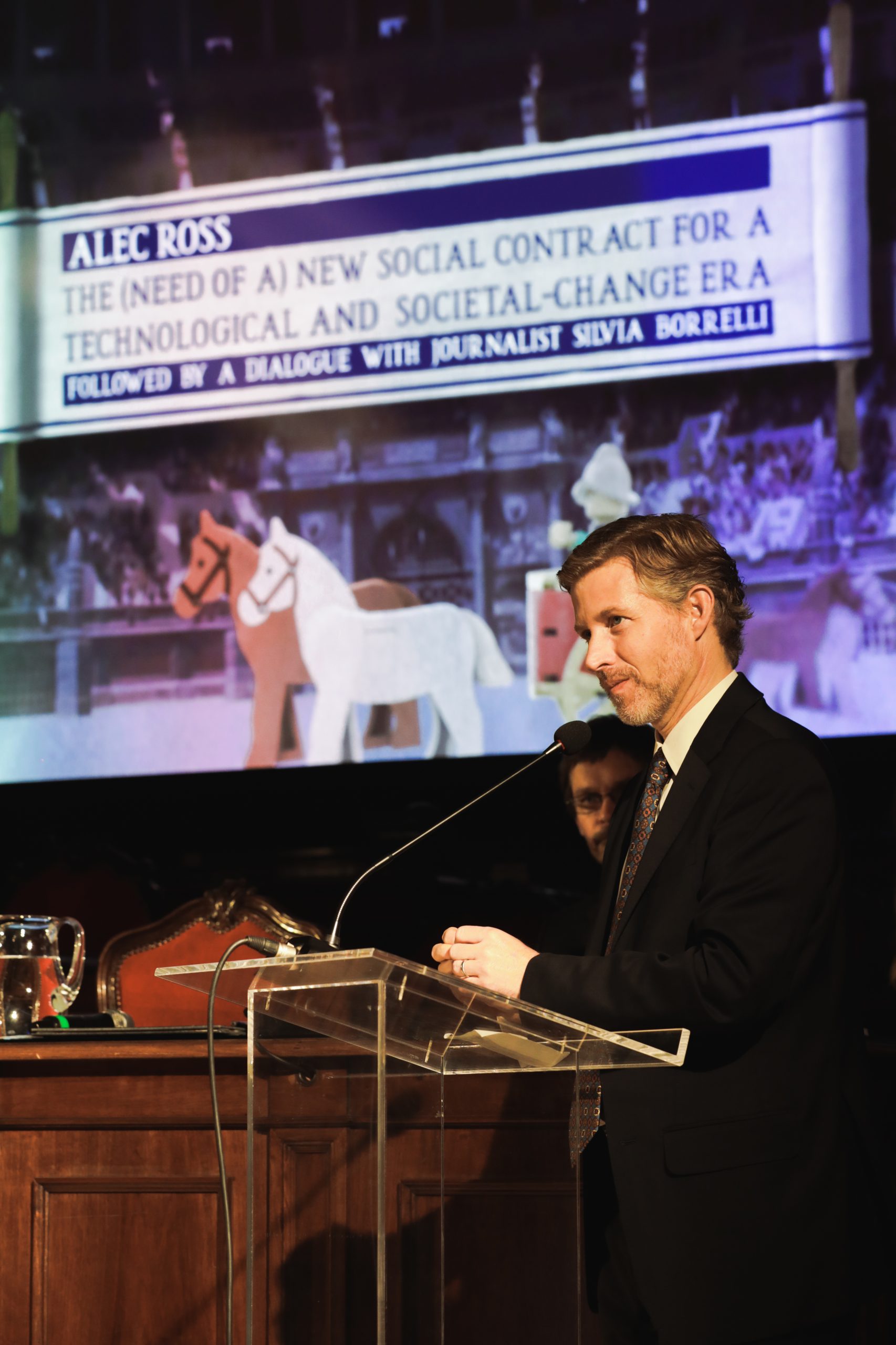
“With great power comes great responsibility, and so the great powers need to come together to work with us, consumers, to imagine and invent a new social contract to define this digitisation.”
Alec Ross, Distinguished Visiting Professor at l’Universitá di Bologna Business School
He referenced back to how new labour rules and social norms slowly entered the industrial age as it went about revolutionizing work – rules such as pensions, child labour, shorter working weeks etc.
The human and economic cost of conflict
It was then to Paulo Portas, Portugal’s former Minister of Foreign Affairs and Deputy Prime Minister who sketched out what might be ahead on the geopolitical front.
His expert dissection considered not only the human cost, but how the wider economic impacts of conflicts play out.
He reminded us why people’s political choices cannot be fully separated from economic performance, and consumers’ spending power. For example, a pattern in US politics has been true in all but one presidential election: a recession in the 12 months before an election equals a loss for the incumbent; growth in that year means they stay in power.
This is one reason why the US is doing everything they can to contain and confine the conflict in Israel and Gaza so that it doesn’t ignite wider regional tensions. Not only to limit suffering but to make sure the recovery of the US economy post-covid will continue without a further shock in the price of oil that a larger conflict would bring.
Portas also considered the redrawing of protectionist boundaries which might threaten globalization. He was skeptical that ‘de-globalisation’ which would mean the closing off of commerce and trade across borders would happen. However, he was wary of what he saw as the more likely trend of fragmentation:

“Fragmentation is more worrying as it makes prices rise. Fragmented globalization is the regionalisation of globalization where countries do business only with their allies…this will dampen growth and GDP”
Paulo Portas, Former Minister of Foreign Affairs and Deputy Prime Minister and Portugal
In relation to the race for pole position in technology, Portas believes that the US has made up ground in some areas and is now neck and neck with the Chinese in terms of scientific leadership in sensitive technologies. The US has advanced language and image processing, vaccines and quantum computing, while the Chinese are ahead in areas like 6G, electric batteries and drones.
This matters as moving on from a reliance on fossil fuels like oil and establishing a lead in technology is an urgent driving strategy of most major economies. And if we find ourselves in the ‘fragmentation’ scenario where trade in technologies might be limited it could pose a problem for growth and for the green transition.
Inflation: a failure to defend consumer rights?
Technology, sustainability and inflation were picked up and picked apart by prolific academic thinker Carlo Alberto Carnevale-Maffe in a talk called ‘Where is the Global Economy Going after Everything (covid, inflation, ChatGPT etc).’
Carnevale-Maffe sets out three core consumer rights: price stability, fair competition and an open market. This leads to the stark conclusion that current stubborn and high inflation is not just a household budget problem but represents the failure of Europe’s ability to defend consumers rights.
He challenged the narrative that ‘Putin is to blame’ for starting the rise in inflation in Europe, showing that inflation was already occurring around 18 months before. However, the Central Bank did not intervene until the summer of 2022 and appeared to be in denial that it was becoming a more permanent phenomenon. He laid responsibility at the feet of ineffective, fragmented energy policy in the EU which caused spikes in prices. Consumers need to be more involved, especially where alternative sources like nuclear are coming in to replace reliance on imported, natural gas. Here Carnevale-Maffe was clear:
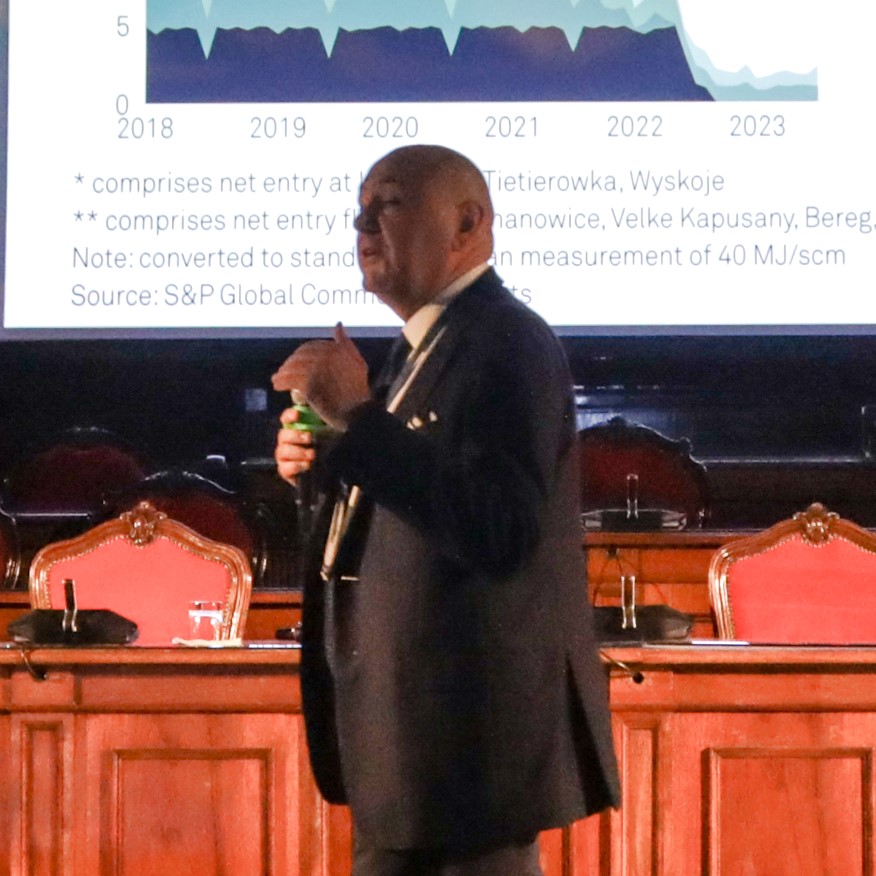
“It’s a failure if the real interests of consumers and citizens are not represented to politicians. Because energy policy is a fundamental pillar of defending consumer rights. If we miss the right sources then of course, we will create the premises for inflation”
Carlo Alberto Maffe-Carnevale, Associate Professor of the Practice of Strategy and Entrepreneurship at SDA Bocconi School of Management.
Goods versus services?
Carnevale-Maffe warned of a dimming growth prospect and that inflation is here to stay. This has huge implications for consumer spending if we add the ‘twin’ green and tech transition to the mix. Policy makers are pinning hopes on these two transitions to dramatically increase energy efficiency and reduce carbon pollution.
He asked if it is fair to expose consumers to high interest rates to invest in expensive fixed asset technologies like electric cars or heat pumps etc if technology is changing so quickly that they may not be worth it? This poses a challenge for consumer organisations on what to advise consumers on the best course of action in fast moving times – particularly as subscription costs could come at a higher price than buying.
Euroconsumers: a manifesto for change
At Euroconsumers we are respectful of these multilayered challenges but not daunted by them.
At the Forum, we launched the Euroconsumers Manifesto which sets out what empowering people to improve the market means in practice when economic, technological, ecological and social transitions hit at the same time.
The manifesto was introduced by Els Bruggeman, head of enforcement and policy at Euroconsumers who explained the heart of the vision to empower people so they can push markets towards innovations and opportunities that can better meet their needs. She went on to say:
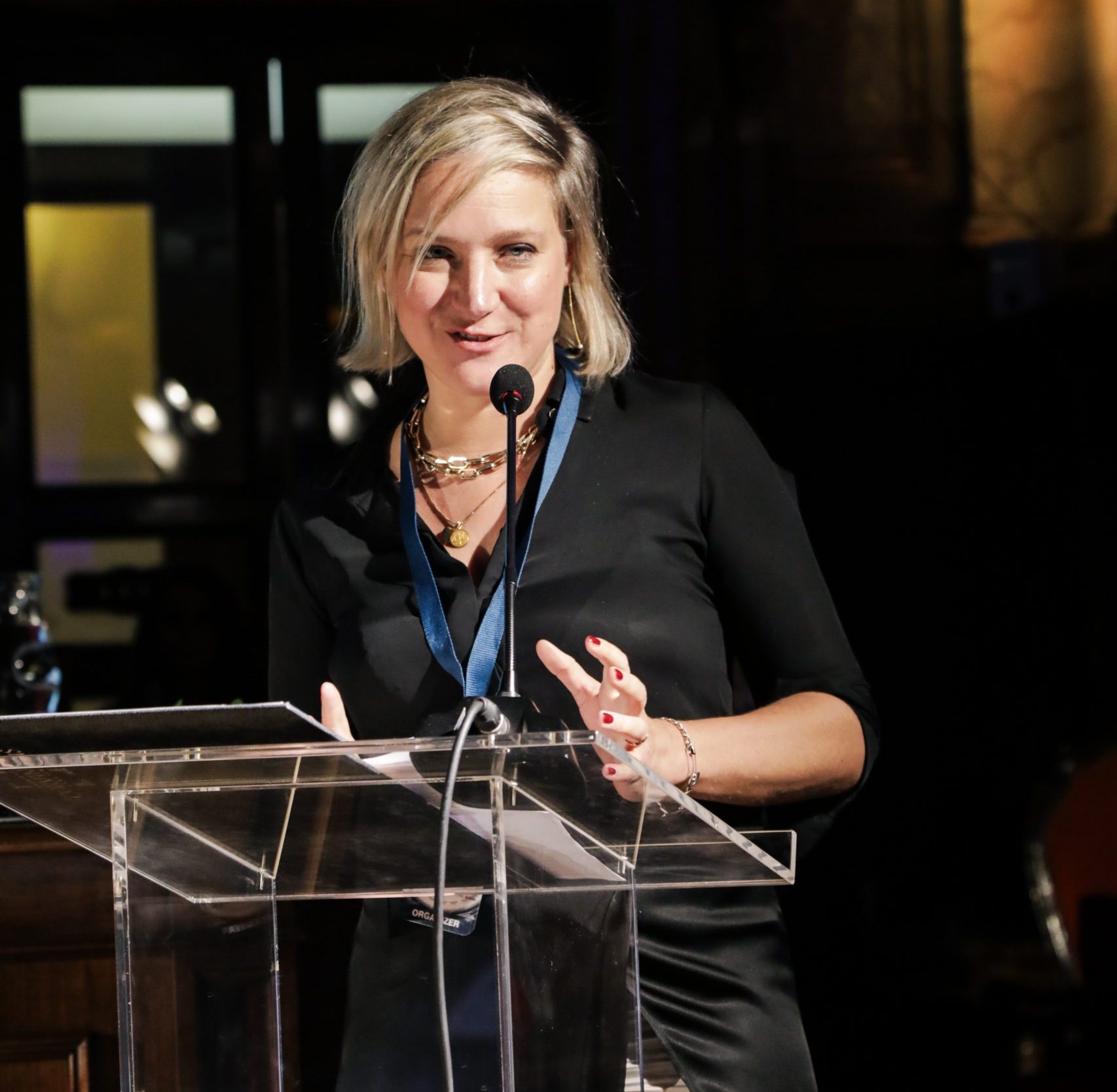
“We are not here to preach, we are here to act, we are here to make things real. We will empower people and improve the market for a digital future, a sustainable future and an affordable future. This is a groundbreaking manifesto that will be our beacon for the years to come. It will guide our activities starting from today.”
Els Bruggeman, Head of Policy and Enforcement, Euroconsumers
Amongst the other fireside chats, panels and speakers, the Euroconsumers Forum 2023 also celebrated the 50th anniversary of our Italian member Altroconsumo.
Read Marco Pierani’s closing speech wrapping up the key themes of the day and sharing how collectively consumer organisations, companies and institutions can take the lead at this pivotal crossroads.
You can rewatch the whole day here which also included fireside chats with leaders of global market players including Lucy Cronin, EU Vice President for Public Affairs at Amazon; Melissa Ferretti Peretti, VP Google Italy; Anita Orban, Public Affairs & ESG Director at Vodafone.
You will also hear from: Paolo Martinello, President, Altroconsumo Foundation, Federico Cavallo, Head of Public Affairs and Media Relations, Altroconsumo; Paolo Iabichino, Founder of the Civic Brands Observatory at Ipsos; Stefano Bartezzaghi, Writer and semiologist; Mario Pezzotti, Commissioner at CREA (Agriculture Research and Agricultural Economics Analysis) and Marc Aupetitgendre, Head of Marketing Region EMEA at BAYER.
The Euroconsumers Forum 2023 was proudly supported by our partners: Amazon, Google, Vodafone, Barilla Group, Bayer, Eurospin, and Ferrero, as well as our supporters, the Metropolitan City of Rome, the Brazilian Embassy and the Italian Representation of the European Commission.

